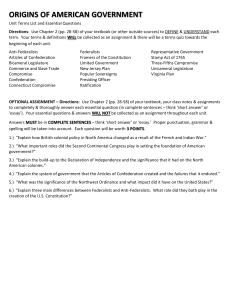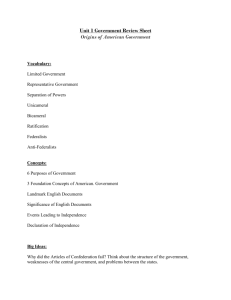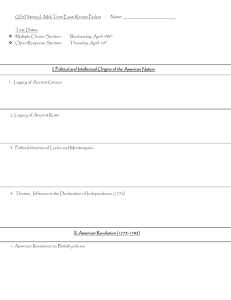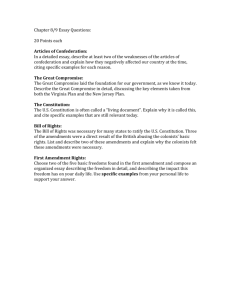study guide
advertisement
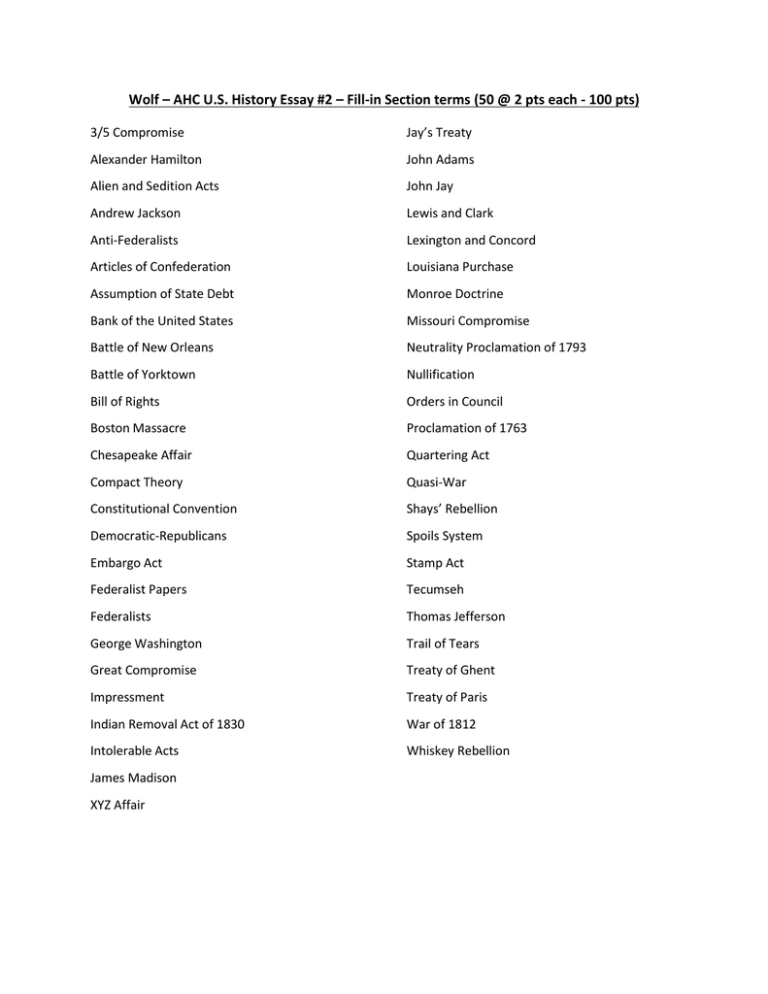
Wolf – AHC U.S. History Essay #2 – Fill-in Section terms (50 @ 2 pts each - 100 pts) 3/5 Compromise Jay’s Treaty Alexander Hamilton John Adams Alien and Sedition Acts John Jay Andrew Jackson Lewis and Clark Anti-Federalists Lexington and Concord Articles of Confederation Louisiana Purchase Assumption of State Debt Monroe Doctrine Bank of the United States Missouri Compromise Battle of New Orleans Neutrality Proclamation of 1793 Battle of Yorktown Nullification Bill of Rights Orders in Council Boston Massacre Proclamation of 1763 Chesapeake Affair Quartering Act Compact Theory Quasi-War Constitutional Convention Shays’ Rebellion Democratic-Republicans Spoils System Embargo Act Stamp Act Federalist Papers Tecumseh Federalists Thomas Jefferson George Washington Trail of Tears Great Compromise Treaty of Ghent Impressment Treaty of Paris Indian Removal Act of 1830 War of 1812 Intolerable Acts Whiskey Rebellion James Madison XYZ Affair Wolf – AHC U.S. History Essay #2 – Short Essay Questions study guide Be prepared to answer the following prompts in short essay format. For each essay prompt you will be graded on both the accuracy of your response as well as the quantity and quality of your supportive EVIDENCE (concrete/specific details and examples). You will be required to answer TWO of the prompts, as determined by rolling the dice on the day of the exam. 100 pts each (200 pts total) 1. In general, why did colonists become dissatisfied with British rule beginning in 1763? What specific events led colonists to become angry, and why did these events lead Americans to declare independence from England and start the American Revolution? 2. The Articles of Confederation established the first U.S. government in 1781. However, the government they created proved to be too weak to be effective, and so the Articles were ultimately replaced by the U.S. Constitution in 1788. Discuss the specific weaknesses of the Articles of Confederation, explain why the Founding Fathers set up the new government that way, and explain why those weaknesses resulted in the Founders’ decision to abandon the articles and start over. 3. At the Constitutional Convention, the Federalists and Anti-Federalists debated what type of national government should be established with the new Constitution. Discuss the arguments of the Federalists and the Anti-Federalists. What did each side want, and what arguments did each side make? In what specific ways was the final draft of the Constitution a compromise between both sides? 4. Between the end of the American Revolution and 1820, the United States expanded from the original 13 colonies to stretch all the way to the Oregon coast. Briefly tell the story of American expansion during this period: when did the United States acquire new territories, how did they acquire those territories, and from who? 5. The War of 1812 marked a dramatic shift in the United States away from regional division and toward a sense of unity and nationalism. Discuss the specific causes of the war, and describe the ways in which the outcome of the war led to this sense of unified nationalism for Americans. Be sure to identify which regions of the country opposed the war, which regions supported it, and why. 6. Prior to the presidency of Andrew Jackson, political power in the United States had largely been in the hands of the elites. Discuss the ways that Andrew Jackson’s presidency represented a shift to “popular democracy” with power in the hands of the common masses. To what extent did Jackson’s presidency achieve Thomas Jefferson’s earlier vision of popular democracy in America?
